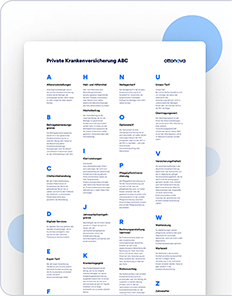Backdating in health insurance
Backdating is an insurance tool that can be used to bring forward the start date of an insurance policy. The following article explains exactly what this means.

Backdating is an insurance tool that can be used to bring forward the start date of an insurance policy. The following article explains exactly what this means.

Table of Contents
Gaps can be a disadvantage not only in your CV, but also in your insurance cover. This is why backdating is available in private health insurance. This allows the start of insurance to be brought forward under certain conditions. In general, backdating is possible up to two months after the start of insurance - with ottonova, backdating is possible for longer than two months.
There are two typical applications for backdating in private health insurance:
If you switch from statutory to private insurance, there must be no gaps in your insurance cover. However, it may be the case that membership in the statutory health insurance ends on June 30, for example, but the private health insurance contract is not accepted until July 12. Backdating ensures a complete insurance history.
Backdating can also be useful for spouse re-insurance or child re-insurance. You can apply to have your children included in private health insurance within two months of the birth. With backdating, the start of insurance is set to the date of birth.
Backdating business deals and start dates are commonplace in certain industries. Life insurance and auto insurance policies, for instance, are frequently backdated for several months.
However, it is generally deemed fraudulent for an agent to include an incorrect start date on the policy in most contracts. Additionally, many policies include provisions that prohibit backdating.
In private health insurance, the backdating waiting period refers to the period of time between when an individual purchases a health insurance policy and when coverage begins. This waiting period is often imposed to prevent individuals from purchasing insurance only after they become aware of a medical condition that requires immediate treatment, thereby mitigating adverse selection for insurance companies.
During this waiting period, the individual may not be eligible for coverage for certain types of treatments or services. The length of the waiting period can vary depending on the insurance provider and the specific policy. In some cases, insurance companies may allow the waiting period to be backdated to the date the policy was purchased, ensuring continuous coverage without gaps.
It's essential for individuals considering private health insurance to understand the terms of the waiting period in their policy to avoid any unexpected limitations or exclusions in coverage.
There is an exception to the previously mentioned backdating rule. This exception applies when you wish to add a newborn as a dependent to your policy.
Every policy has its own guidelines regarding adding a child as a dependent, whether through birth, adoption, marriage, or fostering, so it's important to verify with your provider first. Following the arrival of a child into your family, health insurance stocks typically provide a specific timeframe during which you can include them as a dependent on your policy. This period usually extends to two to three months after the child's birth or their addition to the family.
Once you've added them as a dependent, the insurer will retroactively apply health coverage. Usually, they won't need to fulfill any waiting periods that the policyholder has already served.
However, it's crucial not to miss this timeframe. Failing to claim a child as a dependent promptly might result in out-of-pocket expenses for certain procedures or being subjected to new waiting periods.
Consult with your insurer to ascertain the duration within which you're allowed to wait before claiming a child as a dependent.
An aspect that intersects with the query "can health insurance be backdated?" involves switching healthcare providers. Individuals who currently hold health insurance might hesitate to switch due to concerns about waiting periods.
Thankfully, there are regulations in place to safeguard health stock members from such concerns. Any waiting periods that you've already fulfilled with your current health stock will carry over to your new policy.
This implies that if you've completed six out of the required twelve months for benefits, those six months will be honored in your new policy. If your tenure with your current reserve exceeds 12 months and you're not adding new services, you won't encounter any waiting periods.
This regulation, known as portability, empowers individuals to seek better-value health insurance while maintaining coverage. It's important to note that portability laws solely pertain to hospital coverage.
Individuals switching insurance providers for extras may need to undergo waiting periods again, although most health funds acknowledge portability with their extras policies. Several significant rules govern portability.
Firstly, ensuring there's no gap in coverage is crucial. Additionally, any relevant waiting periods must be fulfilled when upgrading cover for the specific services being upgraded only. Funds typically allow a brief interval between transitions, usually up to a maximum of 30 days.

Insurance with its many technical terms can be really complicated. Our overview with explanations of the most important terms used in private health insurance helps. Get your free PKV-ABC here!
At ottonova, we strive to make our website as accessible as possible. Therefore, please use accessibility@ottonova.de exclusively for suggestions and comments regarding accessibility on the website.
Are you already insured with ottonova and have another issue? Please log in to the web app and contact us there. Please only share sensitive data such as health information in your secure area within the app or web app.
If you are not yet insured with us and have questions about our insurance products, please feel free to contact us via chat or email.
By entering your data you agree to be contacted by ottonova via phone, SMS and email. Good to know: